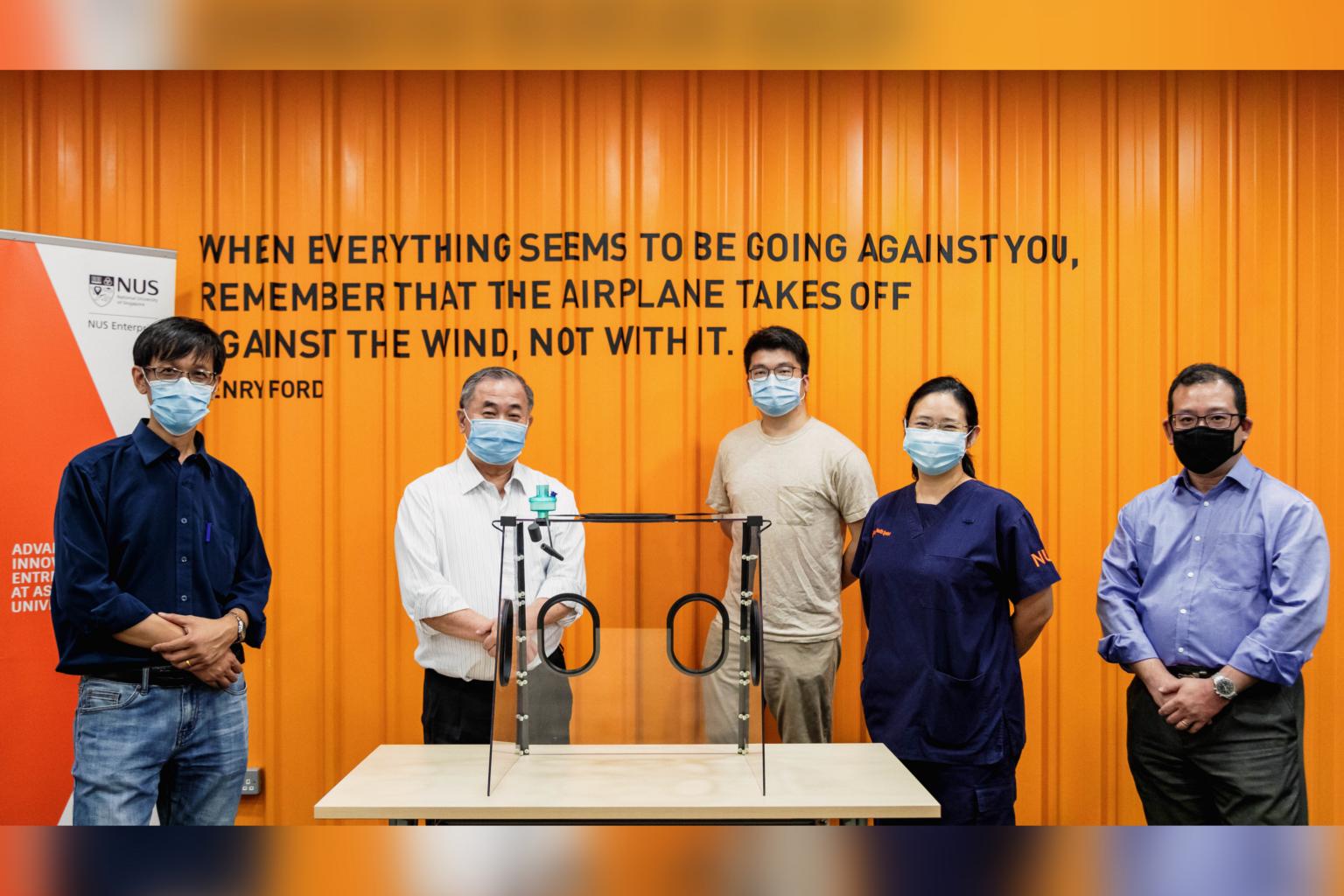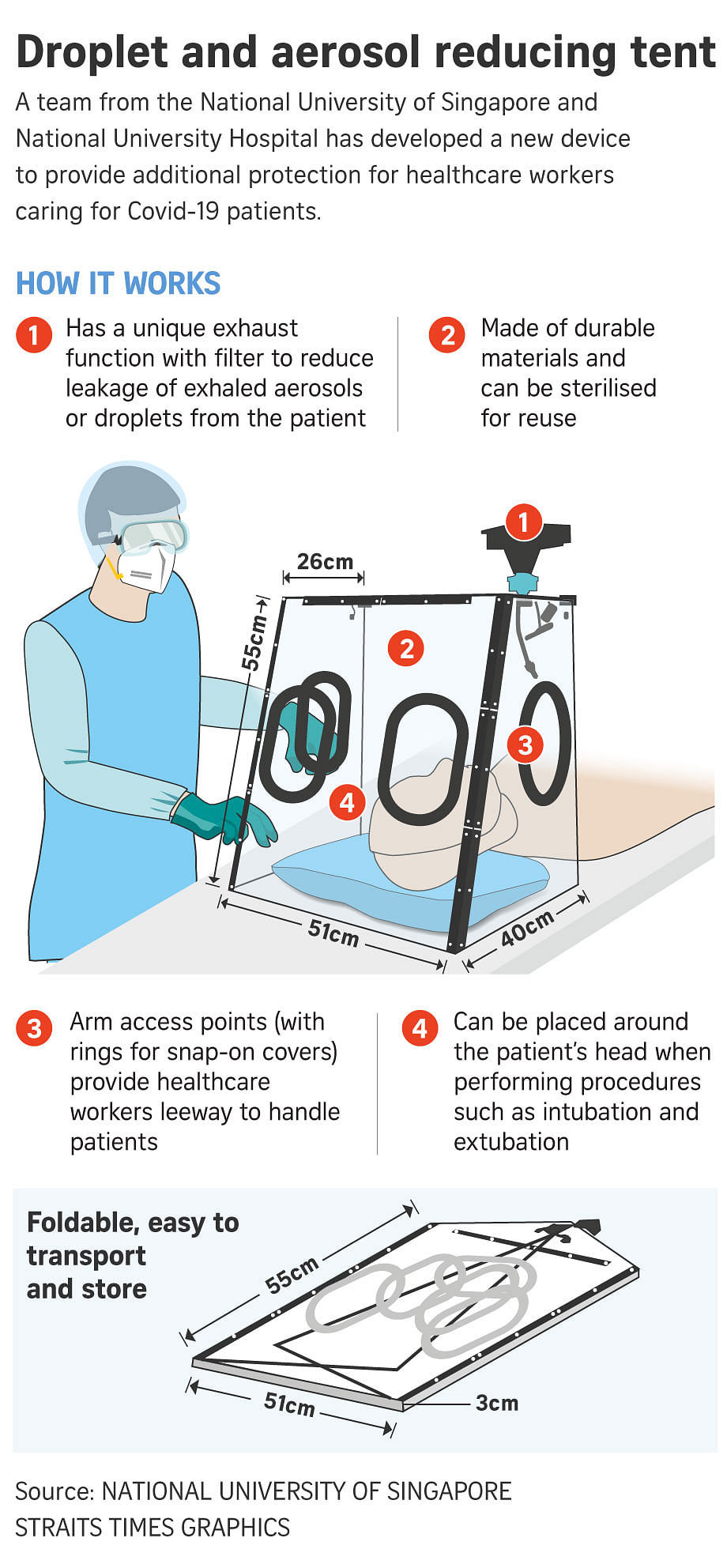NUS scientists create foldable tent device to reduce virus exposure to medical staff treating Covid-19 patients
Sign up now: Get ST's newsletters delivered to your inbox

The droplet- and aerosol-reducing tent (Dart) is a clear plastic tent placed around a patient's head, and has four access ports.
PHOTO: NATIONAL UNIVERSITY OF SINGAPORE
SINGAPORE - To further protect healthcare workers from Covid-19, researchers from the National University of Singapore (NUS) have invented a foldable tent-like device that acts as a physical shield against the virus while they perform medical procedures that generate droplets and aerosols.
Intubation for instance, where a tube is inserted into the windpipe, may cause a patient to cough. This puts medical staff or first responders performing this procedure at risk of infection.
The droplet- and aerosol-reducing tent (Dart), as it is called, is a clear plastic tent measuring about 51cm by 40cm at its base and 55cm high. It is placed around a patient's head, and has four access ports where disposable sleeves can be attached for staff to reach in and safely perform medical procedures.
Negative pressure within the tent is created when connected to the hospital's central vacuum system or a battery-operated filtration system using a Hepa filter, to reduce leakage of exhaled aerosols or droplets from the patient.
This makes the tent useful in hospitals as well as makeshift wards said Professor Freddy Boey, NUS deputy president of innovation and enterprise, who led the project.
Constructed of polycarbonate panels and 3D-printed nylon joints, the device can be decontaminated for reuse by alcohol or steam sterilisation, or other methods used in hospitals. It weighs 3kg and can be folded flat for portability and easy storage.
Besides cutting the risk of infection associated with aerosol generating procedures such as suctioning, intubation and extubation, the device also reduces contamination of the surroundings, which can also be a source of transmission.
"There is a need to additionally provide a safe environment for our healthcare workers who are treating Covid patients. I think just having PPE (personal protective equipment), goggles and N95 mask may not be fully sufficient," said Prof Boey.
Healthcare workers are at risk of Covid-19 infection due to close contact with patients.
Last month, the Centres for Disease Control and Prevention in the US reported that more than 60,000 healthcare workers have been infected, and close to 300 have died.
In Singapore, there were 66 confirmed cases of Covid-19 among healthcare workers in Singapore as of April 26, although it was found that they were not infected at work.

Dart was designed in collaboration with doctors from the National University Hospital (NUH), and was two months in the making.
The research team believes that this is the first of such a device available that is both foldable and has a special filter function to reduce leakage of exhaled aerosols or droplets from patients.
They have sent 25 prototypes for testing in various departments and hospitals including NUH, Tan Tock Seng Hospital, Thomson Medical Centre, and several private hospitals run by Parkway Hospitals Singapore.
It will be commercialised after being refined based on feedback from the hospitals.
The team will partner Temasek Foundation - which previously donated Covid-19 test kits and ventilators to countries such as Indonesia and The Philippines - to distribute Dart to hospitals in the region.
The researchers are currently working with the NUS Faculty of Dentistry to develop a similar device for dentists, and it will be available within one or two months, said Prof Boey.


